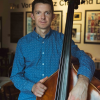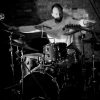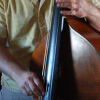Home » Jazz Musicians » Charles Mingus
Charles Mingus
One of the most important figures in twentieth century American music, Charles Mingus was a virtuoso bass player, accomplished pianist, bandleader and composer. Born on a military base in Nogales, Arizona in 1922 and raised in Watts, California, his earliest musical influences came from the church— choir and group singing— and from "hearing Duke Ellington over the radio when [he] was eight years old." He studied double bass and composition in a formal way (five years with H. Rheinshagen, principal bassist of the New York Philharmonic, and compositional techniques with the legendary Lloyd Reese) while absorbing vernacular music from the great jazz masters, first-hand. His early professional experience, in the 40's, found him touring with bands like Louis Armstrong, Kid Ory and Lionel Hampton.
Eventually he settled in New York where he played and recorded with the leading musicians of the 1950's— Charlie Parker, Miles Davis, Bud Powell, Art Tatum and Duke Ellington himself. One of the few bassists to do so, Mingus quickly developed as a leader of musicians. He was also an accomplished pianist who could have made a career playing that instrument. By the mid-50's he had formed his own publishing and recording companies to protect and document his growing repertoire of original music. He also founded the "Jazz Workshop," a group which enabled young composers to have their new works performed in concert and on recordings.
Mingus soon found himself at the forefront of the avant-garde. His recordings bear witness to the extraordinarily creative body of work that followed. They include: Pithecanthropus Erectus, The Clown, Tijuana Moods, Mingus Dynasty, Mingus Ah Um, The Black Saint and the Sinner Lady, Cumbia and Jazz Fusion, Let My Children Hear Music. He recorded over a hundred albums and wrote over three hundred scores. Although he wrote his first concert piece, "Half-Mast Inhibition," when he was seventeen years old, it was not recorded until twenty years later by a 22-piece orchestra with Gunther Schuller conducting. It was the presentation of "Revelations" which combined jazz and classical idioms, at the 1955 Brandeis Festival of the Creative Arts, that established him as one of the foremost jazz composers of his day.
In 1971 Mingus was awarded the Slee Chair of Music and spent a semester teaching composition at the State University of New York at Buffalo. In the same year his autobiography, Beneath the Underdog, was published by Knopf. In 1972 it appeared in a Bantam paperback and was reissued after his death, in 1980, by Viking/Penguin and again by Pantheon Books, in 1991. In 1972 he also re-signed with Columbia Records. His music was performed frequently by ballet companies, and Alvin Ailey choreographed an hour program called "The Mingus Dances" during a 1972 collaboration with the Robert Joffrey Ballet Company.
Read moreTags
Charles Mingus, Victor Feldman, and Chris McGregor

by Jerome Wilson
I was not able to do a live show last week so here is an old show from December 2020 that featured Charles Mingus, Brian Lynch, Gary Burton, Victor Feldman, and Chris McGregor. Playlist Henry Threadgill Sextett “I Can't Wait Till I Get Home" from The Complete Novus & Columbia Recordings of Henry Threadgill & Air (Mosaic) 00:00 Karrin Allyson “Good Morning Heartache" from Azure Te (Concord) 1:06 Tania Grubbs Quintet “Bird on a Wire" from Live at ...
Continue ReadingClod Ensemble + Nu Civilisation Orchestra At Barbican Theatre

by Chris May
Clod Ensemble + Nu Civilisation Orchestra Barbican Theatre The Black Saint And The Sinner Ladyjny: London September 19, 2024 We will never know exactly what Charles Mingus meant by the title of his suite The Black Saint And The Sinner Lady (Impulse!, 1963). Indeed, Mingus himself may not have known, though righteous anger was evidentially part of the music, as it was with so much of his work. Mingus declined to articulate ...
Continue ReadingCharles Mingus: Charles Mingus Presents Charles Mingus To Pre Bird Revisited

by Chris May
In his liner notes for Charles Mingus Presents Charles Mingus To Pre Bird Revisited, Bill Shoemaker sets out the context in which the two featured albums should be considered. He observes that so enormous was Charles Mingus' artistic vision that no two (or perhaps three) albums can encompass its totality. How true that is, even of the pairing of two Mingus albums that are as different as could be: Charles Mingus Presents Charles Mingus (Candid, 1960) and Pre Bird (Mercury, ...
Continue ReadingCharlie Parker, Dizzy Gillespie, Bud Powell, Charles Mingus, Max Roach: Hot House: The Complete Jazz at Massey Hall Recordings

by Richard J Salvucci
This is the stuff of legend, one for the ages. It all started here; the greatest jazz concert of all time. How many times has the Massey Hall Concert (Toronto, 1953) been described that way? For the average All About Jazz reader, Massey Hall happened before he or she was born. Besides, there were other famous jazz concerts such as The Carnival of Swing (Randall's Island, NY, 1938), Benny Goodman's 1938 Carnegie Hall Concert (that remained unreleased until 1958), Gene ...
Continue ReadingCharles Mingus: At Antibes 1960 Revisited

by Mark Corroto
At Antibes could easily be an all-time favorite Charles Mingus recording if he had not produced such extraordinary sessions as Mingus Ah Um (Columbia, 1959), Charles Mingus Presents Charles Mingus (Candid, 1961), The Black Saint And The Sinner Lady (Impulse!, 1963) and Mingus Mingus Mingus Mingus Mingus (Impulse!, 1964). Listeners can make their own picks, but this live recording from 1960 at the Antibes Jazz Festival in Juan-les-Pins, France, has a power unique unto itself. One can almost feel the ...
Continue ReadingCharles Mingus: At Antibes 1960 Revisited

by Chris May
Charles Mingus' exhilarating blend of roots and the avant-garde only rarely seems as binary* (see below) as it does on this recording from the 1960 Antibes Jazz Festival. Most often on a Mingus album, you do not hear the joins. This time, on one level, you do. Mingus leads a pianoless quintet completed by Booker Ervin on tenor saxophone, Eric Dolphy on alto saxophone and bass clarinet, Ted Curson on trumpet and Dannie Richmond on drums. Bud Powell ...
Continue ReadingThe Vocal Music of Charles Mingus, Part 2

by Ellen Johnson
Part 1 | Part 2 Early Years: 1945 to 1953 Charles Mingus demonstrated his prowess as a songwriter even in the early stages of his career. Surprisingly, he started writing songs as early as 1945, a fact that often goes unnoticed. This collection of early vocal compositions includes titles such as “The Texas Hop" (1945), “Baby, Take a Chance with Me" (1945), “Ain't Jivin' Blues" (1946), “Weird Nightmare" (1946), “Pacific Coast Blues" (1948), “Boppin' in Boston" (1949), “I've ...
Continue ReadingCharles Mingus: Peggy's Blue Skylight

Source:
JazzWax by Marc Myers
About an hour and 45 minutes north of Manhattan sits the village of Millbrook, N.Y. In the 1960s, a sprawling American Queen Anne mansion just outside the village became something of a counterculture landmark. Built in 1912, the house and the 2,500-acre estate was acquired at the start of the 1960s by the twin sons of the wealthy Mellon-Hitchcock family. The sons' grandfather was William Larimer Mellon, a co-founder of Gulf Oil. Their mother, Margaret, had married Thomas Hitchcock Jr., ...
read more
Jazz Musician of the Day: Charles Mingus

Source:
Michael Ricci
All About Jazz is celebrating Charles Mingus' birthday today!
One of the most important figures in twentieth century American music, Charles Mingus was a virtuoso bassist, accomplished pianist, bandleader and composer. Born on a military base in Nogales, Arizona in 1922 and raised in Watts, California, his earliest musical influences came from the church— choir and group singing— and from “hearing Duke Ellington over the radio when [he] was eight years old." He studied double bass and composition in a ...
read more
Jazz Musician of the Day: Charles Mingus

Source:
Michael Ricci
All About Jazz is celebrating Charles Mingus' birthday today!
One of the most important figures in twentieth century American music, Charles Mingus was a virtuoso bassist, accomplished pianist, bandleader and composer. Born on a military base in Nogales, Arizona in 1922 and raised in Watts, California, his earliest musical influences came from the church— choir and group singing— and from “hearing Duke Ellington over the radio when [he] was eight years old." He studied double bass and composition in a ...
read more
New England Conservatory Celebrates Centennial Of Charles Mingus

Source:
Braithwaite & Katz Communications
New England Conservatory celebrates the centennial of seminal American composer / bassist / bandleader / record label founder / activist / poet Charles Mingus with two concerts featuring NEC’s renowned faculty members and jazz students and a panel discussion. The events are free and open to the public. They take place: Tuesday, April 19Charles Mingus Centennial Panel 1:00 p.m., Pierce Hall NEC faculty member Jason Moran, bass trombonist and Mingus alumnus Earl McIntyre and others discuss Charles Mingus’s life and ...
read more
Jazz Musician of the Day: Charles Mingus

Source:
Michael Ricci
All About Jazz is celebrating Charles Mingus' birthday today!
One of the most important figures in twentieth century American music, Charles Mingus was a virtuoso bassist, accomplished pianist, bandleader and composer. Born on a military base in Nogales, Arizona in 1922 and raised in Watts, California, his earliest musical influences came from the church— choir and group singing— and from “hearing Duke Ellington over the radio when [he] was eight years old." He studied double bass and composition in a ...
read more
Jazz Musician of the Day: Charles Mingus

Source:
Michael Ricci
All About Jazz is celebrating Charles Mingus' birthday today!
One of the most important figures in twentieth century American music, Charles Mingus was a virtuoso bassist, accomplished pianist, bandleader and composer. Born on a military base in Nogales, Arizona in 1922 and raised in Watts, California, his earliest musical influences came from the church— choir and group singing— and from “hearing Duke Ellington over the radio when [he] was eight years old." He studied double bass and composition in a ...
read more
Jazz Musician of the Day: Charles Mingus

Source:
Michael Ricci
All About Jazz is celebrating Charles Mingus' birthday today!
One of the most important figures in twentieth century American music, Charles Mingus was a virtuoso bassist, accomplished pianist, bandleader and composer. Born on a military base in Nogales, Arizona in 1922 and raised in Watts, California, his earliest musical influences came from the church— choir and group singing— and from “hearing Duke Ellington over the radio when [he] was eight years old... Read more.
Place our Musician of the Day ...
read more
Jazz Musician of the Day: Charles Mingus

Source:
Michael Ricci
All About Jazz is celebrating Charles Mingus' birthday today!
One of the most important figures in twentieth century American music, Charles Mingus was a virtuoso bassist, accomplished pianist, bandleader and composer. Born on a military base in Nogales, Arizona in 1922 and raised in Watts, California, his earliest musical influences came from the church— choir and group singing— and from “hearing Duke Ellington over the radio when [he] was eight years old... Read more.
Place our Musician of the Day ...
read more
Charles Mingus: Montreux '75

Source:
JazzWax by Marc Myers
On July 20, 1975, Charles Mingus was in Montreux, Switzerland, to perform at the Montreux Jazz Festival. He was on tour to promote Changes One and Changes Two, a pair of albums recorded for Atlantic in December 1974. They are among the bassist's finest albums of the decade and were his first studio recordings in the States up until that point in the 1970s. For better or worse, a bulk of Mingus's 1970s albums were concert recordings. Now, Eagle Rock ...
read more
Jazz Musician of the Day: Charles Mingus

Source:
Michael Ricci
All About Jazz is celebrating Charles Mingus' birthday today!
One of the most important figures in twentieth century American music, Charles Mingus was a virtuoso bassist, accomplished pianist, bandleader and composer. Born on a military base in Nogales, Arizona in 1922 and raised in Watts, California, his earliest musical influences came from the church— choir and group singing— and from “hearing Duke Ellington over the radio when [he] was eight years old... Read more.
Place our Musician of the Day ...
read more




































































































































































